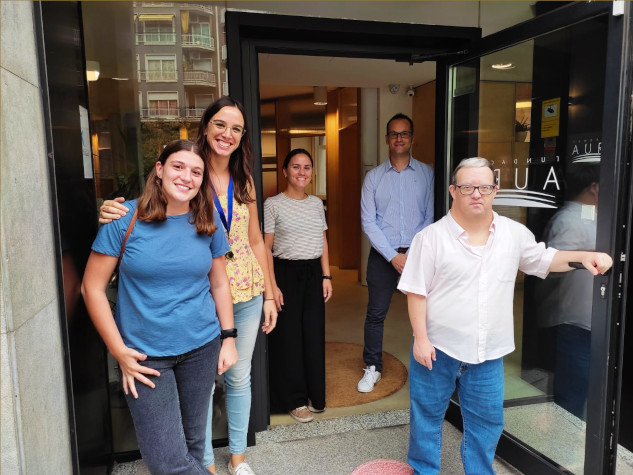Preparing Children and Adults with Down Syndrome for Employment
Introduction: The Importance of Employment
Employment is a significant aspect of life for many individuals, providing a sense of purpose and meaning. It’s crucial to recognize that employment can look different for everyone and that there are various ways individuals can contribute to their community, even outside of traditional employment. People with Down syndrome, like everyone else, can lead fulfilling lives whether they are employed or engaged in other meaningful activities.
Building Employment Skills at Home
The journey to employment begins at home, where many foundational skills are developed. Chores and household tasks play a crucial role in this process. Using choice boards and task lists can be particularly beneficial. Visual aids, such as task lists on a notes app, saving employee IDs and passwords on a password app, or using pocket-sized laminated cards on a key ring with pictures or lists, can help individuals with Down syndrome get accustomed to routines they will encounter in the workplace.
Social Stories and Professional Behavior
Preparing individuals for the professional world involves teaching them what to expect and how to behave. Social stories, which describe various situations and appropriate responses, can be very effective. Regularly using timers and alarms can help manage transitional times, reducing the need to frequently check the time for breaks, return times, or end-of-day routines.
Breaking Down Tasks: Chunking
Large tasks can be overwhelming, so it’s helpful to break them down into smaller, more manageable sections—a technique known as chunking. Providing only two or three tasks at a time can simplify complex tasks. This approach is akin to how we memorize phone numbers in small chunks rather than all at once.
Prompt Fading: Encouraging Independence
Prompt fading is a method used to gradually reduce the assistance provided, encouraging independence. It starts with modeling the task, then performing it together, and finally having the individual do it on their own. This gradual reduction in support helps build confidence and competence.
Incorporating Pre-Vocational Skills at Home
Many everyday activities at home involve pre-vocational skills, even if we don’t always recognize them as such. For example, baking chocolate chip cookies involves a range of skills:
- Grocery Shopping: Enhances spatial awareness by pushing the cart, critical thinking, decision-making to find items, understanding the concept of money, and identifying staff for assistance.
- Baking: Teaches hygiene, following directions, thinking ahead (measuring tools, preheating the oven), emotional regulation (handling spills), technical skills (pouring, stirring, scooping), time management, and safety awareness (cooling off cookies or preheating the oven). It also involves organizing (washing, drying, and putting away dishes).
These activities help develop skills needed to maintain a job in the long term.
Identifying Interests
Understanding an individual’s interests is crucial for job satisfaction and success. Assess their likes, dislikes, and preferred activities. Don’t rely solely on their verbal expressions; observe and expand their general experiences. For example, someone might express interest in working at a pet store because they love animals but might not realize it involves cleaning up after them. Focus on underlying skills or what feels meaningful to them, not just the surface-level activity.
Considering Environmental Conditions
The environment is just as important as the job itself. Factors to consider include location, lighting, noise level, hours, people, cleanliness, and work attire. These conditions can significantly impact job satisfaction and performance.
Starting the Job Search
Begin the job search within the local community. Job shadowing and informational interviews are excellent ways to learn about different jobs. Observing an experienced employee and asking questions can provide valuable insights. Volunteering and internships offer practical work experience and are excellent for job discovery.
Partial Shifts and Informal Introductions
Consider allowing individuals to work partial shifts to try out a job. This hands-on experience helps them learn more about the tasks and the environment before committing. It also gives employers a chance to see how the individual performs in a real work setting.
Preparing children and adults with Down syndrome for employment involves a comprehensive approach that starts at home and extends into the community. By developing foundational skills, using visual aids, and incorporating pre-vocational activities into daily routines, we can help individuals build the confidence and competence needed for employment. Identifying interests and considering environmental conditions ensures job satisfaction and long-term success. With the right support and opportunities, individuals with Down syndrome can find meaningful employment and contribute significantly to their communities.
Expanding the Journey: Community and Support Systems
It’s essential to recognize the role of the broader community and support systems in preparing individuals with Down syndrome for employment. Schools, vocational training centers, and community organizations offer invaluable resources and programs tailored to developing job skills.
Educational Institutions and Vocational Training
Educational institutions play a critical role in early skill development. Many schools offer vocational training programs that focus on practical skills and work readiness. Collaborating with these institutions ensures a cohesive approach to skill development, bridging the gap between school and employment.
Community Organizations and Support Networks
Community organizations provide support networks that are crucial for individuals with Down syndrome and their families. These organizations often offer workshops, job training programs, and social opportunities that help build confidence and social skills. Connecting with these networks can provide additional resources and support.
Employers and Inclusive Hiring Practices
Employers play a pivotal role in creating inclusive work environments. Encouraging employers to adopt inclusive hiring practices and providing them with the necessary resources and training can make a significant difference. This includes understanding the benefits of employing individuals with Down syndrome and recognizing the value they bring to the workplace.
Family and Caregiver Involvement
The involvement of family and caregivers is vital throughout the employment journey. They provide ongoing support, encouragement, and advocacy. Families can help identify interests, assist with job searches, and provide the necessary support during the transition into employment.
Technology and Assistive Tools
Leveraging technology and assistive tools can enhance job performance and independence. From task management apps to communication devices, technology can bridge gaps and provide the support needed for various job tasks. Encouraging the use of these tools from an early stage helps individuals become proficient and confident in their use.
Ongoing Support and Professional Development
Employment is not a one-time achievement but an ongoing journey. Continuous support and professional development opportunities are essential for long-term success. This can include on-the-job training, mentorship programs, and opportunities for career advancement.
Celebrating Achievements and Success Stories
Finally, it’s important to celebrate the achievements and success stories of individuals with Down syndrome in the workplace. Sharing these stories not only recognizes their accomplishments but also inspires others and promotes a positive image of what individuals with Down syndrome can achieve.
Preparing children and adults with Down syndrome for employment is a multifaceted process that involves the collaboration of families, educational institutions, community organizations, employers, and the individuals themselves. By focusing on developing practical skills at home, identifying interests, considering environmental conditions, and leveraging community support, we can create pathways to meaningful employment. With the right support and opportunities, individuals with Down syndrome can thrive in the workplace and contribute to their communities in significant ways.













